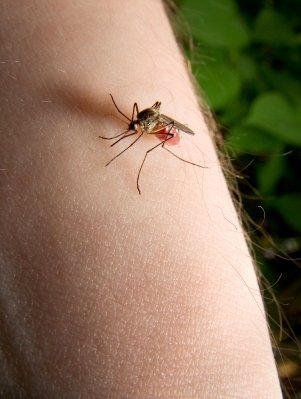Summertime is drawing near, and as we look forward to many days at the beach in the sunshine, I can’t help but shudder at the itchy omen overhead that emerges as darkness falls. Yes, I’m talking about the mosquito, it’s bite, and the disease that it just might carry. The West Nile virus is initially only carried by birds, which infect mosquitoes that drink their blood, who later infect anything else that they bite. Mosquitoes are the prime suspect for transmitting the West Nile virus from person to person, and while in recent years, the hype that has previously been associated with the West Nile virus has subsided, experts predict that this summer may be accompanied by yet another outbreak of West Nile, primarily because of this year’s premature spring.
Protecting yourself and your family from the West Nile virus can be done in a number of ways:
- Report any dead birds to your local municipality. Although some municipalities no longer provide funding for bird related inquiries regarding the West Nile virus, many areas that have implemented mosquito control programs will likely have some sort of venue for bird deaths.
- Clean out any areas of still water around your home. Mosquitoes reproduce and begin their life cycle in still water, which could be in an eaves trough, birdbath, water tank, old bucket or livestock and pet water source. By regularly cleaning out any areas that collect water or effectively mosquito-proofing still water sources such as rain barrels, you can reduce the mosquito population near your home significantly, and lower your risk of acquiring the West Nile virus.
- Limit your time outside when mosquitoes are active. Most mosquitoes will feed around the times of dawn and dusk.
- Use repellent. Mosquitoes avoid those who use a mosquito repellent such as DEET. If you are concerned about the chemicals in repellent sprays, visit your organic grocer to pick up a natural repellent. Ensure that you use any insect repellents as they instruct; most repellents are not recommended for children under two months of age.
- Ensure that your home is mosquito-proof. Check all of your window screens and doors, because even the smallest hole could potentially let in one or two mosquitoes. Be aware that the drip pans in any indoor flower pots could potentially act as a breeding ground for mosquitoes – the last thing you want is baby mosquitoes in your home.
If you think that you may have acquired the West Nile virus, you will exhibit flu-like symptoms including fever, headache and body aches. You can talk to your local healthcare professional for more information on West Nile virus symptoms and long term complications.

